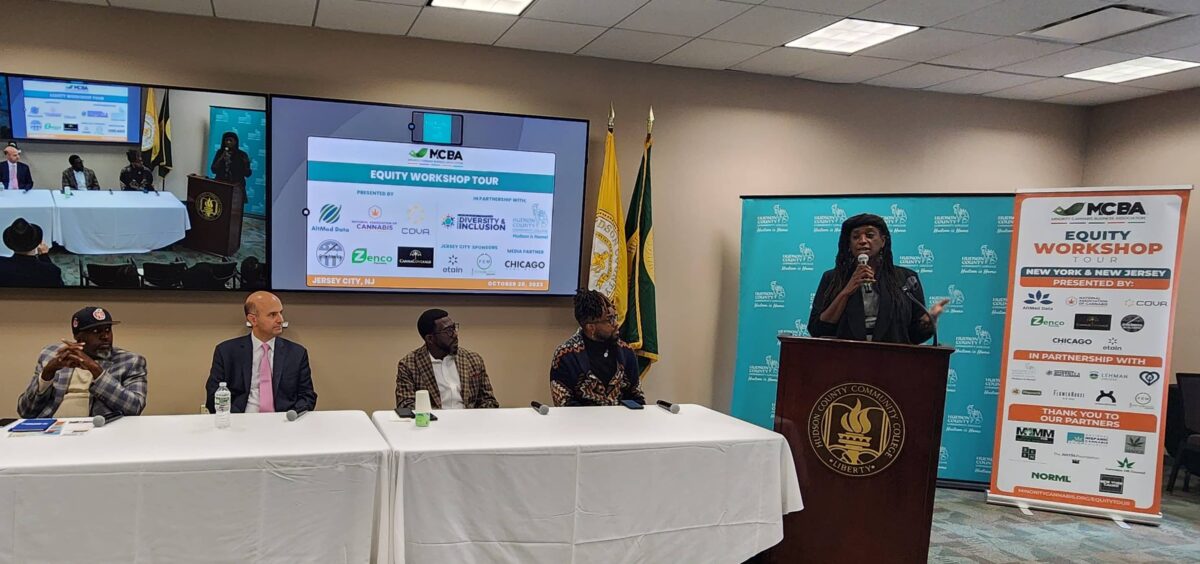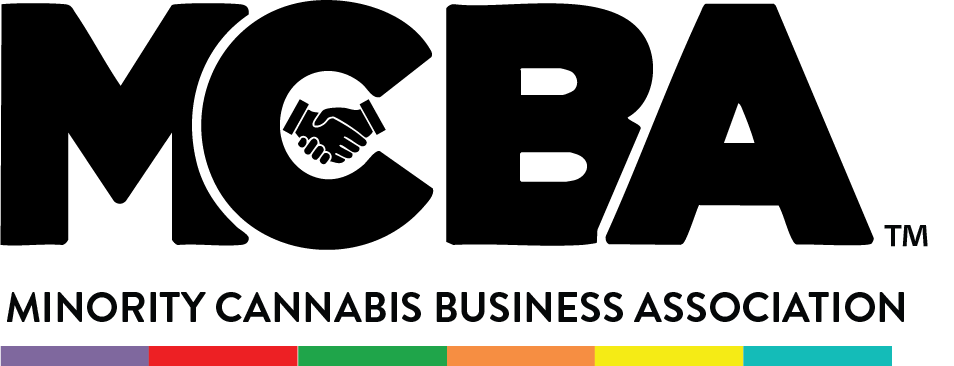
Dan Ulloa

The Minority Cannabis Business Association(MCBA) held a social equity workshop at Hudson County Community College (HCC) last Friday on New Jersey adult-use cannabis licenses.

It was part of their Equity Workshop Tour (EWT) in 10 cities across the United States. The MCBA tour aims to support Social Equityapplicants and operators in the cannabis industry. They held a similar event in Trenton today.
The workshop centered on helping many small businesspeople enter the New Jersey cannabis industry.
The MCBA wanted to promote the Goldilocksthat many New Jersey cannabis advocates, businesspeople, and professionals want to see open licensed cannabis companies. They are minorities, women, and those harmed by the War on Drugs especially.

MCBA organizer Mike Lomuto believed in creating more equity in the industry.
“Approach this from an abundance mindset,” he declared.
“The more you’re in this industry, the more you realize there’s even more to learn,” Lomuto added.
“We want to make sure we’re creating an ecosystem. To create equity, it doesn’t come overnight,” he noted.
THE NEW JERSEY ADULT USE CANNABIS LICENSE PROCESS AND SOCIAL EQUITY
Scheril Murray Powell of the JUSTUS Foundation and Cannabis HR Council moderated the panel that delved into the heart of the issues they wanted to raise. It included NJ Cannabis Regulatory Commission, Diversity and Inclusion Office Director Wesley McWhite, Jersey City Office of Diversity & Inclusion Director Dr. Floyd Jeter, East Orange City Council Chair Christopher Awe, and Hudson County College HCCC, Business school Dean Dr. Ara Karakashian.
CRC SAYS NJ CANNABIS MINORITY OWNSHERIP GOALS EXCEEDED
McWhite noted his Office was written into the New Jersey adult use cannabis referendum implementation law. The Cannabis Regulatory and Marijuana Modernization Act (ACT) designates that they must reach out to underrepresented communities.
It also says that 15 percent of New Jersey adult use cannabis licenses should go to minority, women, and disabled veteran business owners.
According to him, 68 percent of the New Jersey adult use cannabis licenses are owned by them.
“Twenty-one percent have gone to what we call SE businesses,” McWhite declared.
“We are already… one of the most diverse markets in the country,” he exclaimed. “We really do want to get this right… for communities negatively impacted by the War on Drugs.”
“You have exceeded every expectation. You have really demonstrated what legislative intent looks like,” Powell said.
COMMUNITIES AND CANNABIS
“We’re very proud of the process we put out,” Awe said. “I’ve met some of the most talented, skillful people in this place. It’s important to get it right.”
He noted there were hiccups in the process* but they’re working on reforming it.
“Across this country, it’s a collaboration between state legislators, state regulators, and mun leaders, Powell noted.
“When we rolled out this curriculum, there was very little resistance from the community,” Karakashian explained happily.
Powell said the cannabis legalization debate would go from the very local to the global level soon.
“I’m on the ground. It’s about let’s get it done for the people who have been marginalized. If they can’t get a job, let’s create a job,” Jeter declared.
“I’m one of the first municipalities that had a job fair where the line was around the corner because people want this,” he added.
Jeter noted they wanted New Jersey adult use cannabis dispensaries in Jersey City to hire locals.
“If we don’t own our own, they’re gonna take it just like everything else,” he declared.
“I’m 20 plus legacy years myself,” Powell noted to applause.
SPREADING INFORMATION TO IMPACTED COMMUNITIES
McWhite explained they studied other state-legal cannabis markets and their social equity plans.
“There was a lack of our communities to access,” he said. “A part of our Social Equity framework is access to information. It is astounding that some states that have cannabis… some of their agencies don’t have websites.”
McWhite noted legacy operators don’t understand laws and regulations often.
“The legacy community gave us a suggestion of creating a dictionary,” he explained.
HUDSON COUNTY CANNABIS ISSUES DISCUSSED
Karakashian said they want to work with Stockton University on expanding their cannabis studies program to include more subjects. They want to feature online cannabis classes as well, which will be available to students regardless of where they are based.
He also explained they have agreements with ten dispensaries that will open so their students can get jobs there.
“You have to get support in the community. Sometimes, a family of choice is better than a family of origin,” Jeter declared.
“A key lesson I have learned being in this role so far is it is never wrong to over-communicate,” McWhite said. “I don’t think we do enough sharing.
Government transparency in Jersey is an important issue.
“It’s always good to see rooms reflected back at you what you look like,” he noted happily.
HELPING SOCIAL EQUITY OWNED NEW JERSEY ADULT USE CANNABIS LICENSES
McWhite wanted New Jersey cannabis industry operators to continue to be strong advocates for reform.
“We’re in protective mode. We want to get this right and do right by New Jersey,” he said of the CRC.
McWhite noted problems with land, money, and city council approval are preventing many New Jersey adult use conditional cannabis license applicants from converting to the annual cannabis license needed to open.
“I know the dam is going to break when there are legislators who act know what they’re doing in cannabis,” he added.
Karakashian noted that federal cannabis prohibition is difficult for them since they receive some federal money.
“There’s only so much you can do. We’re very limited,” AK admitted.
He noted how difficult the cannabis licensing process is even in Jersey City.
“Too many people want to sit at the table,” Karakashian added.
Jeter said that politicians are easy to speak to when you pay to go to their fundraisers.
“Sometimes you gotta pay to get in,” he noted.
EAST ORANGE CANNABIS ISSUES
Awe noted their work on education and breaking the stigma around cannabis.
“I’m a big advocate of equity in terms of access,” he claimed.
“Sometimes a lot of it is who you know,” Awe admitted about the New Jersey town cannabis licensing process.
He noted they are reforming their cannabis law ordinance. They are working on expanding their Green Zone which is where cannabis companies are allowed in town.
“We missed some things,” Awe admitted.
He also noted the need to include Social Equity in their ordinance specifically.
“Don’t be discouraged. That process is not done,” Awe argued.
He reiterated they’re going to approve more New Jersey adult use cannabis licenses to operate in East Orange.
“It is a work in progress,” Awe added. “This has been an uphill battle for so long.”
Tiyahnn Bryant’s Roll Up Life dispensary and delivery company was initially denied approval in East Orange to open. With the expanded ordinance, he hopes to re-apply and secure approval to be one of the new dispensaries allowed.
THE RULES OF THE JERSEY WEED GAME
“Learn the rules of the game you’re trying to play,” New Jersey cannabis advocate and attorney Jessica Gonzalez told the crowd.
She said the environment isn’t perfect, the barriers are too high, and it remains a very expensive process, leaving many exhausted.
“I wish I could tell you it’s an inexpensive endeavor. I wish I could tell everybody can make it. But I can’t,” Gonzalez admitted.
She noted there are many problems with launching a business with partners.
“Your competitive advantage lies in your anticipation of what comes next,” Gonzalez said.
“You will need the community around you. Get comfortable around the art of pivoting. Pivot or die,” she declared. “Take a hard look at the reality.”
Gonzalez noted there are more grants are coming from the New Jersey Economic Development Authority (NJ-EDA) for New Jersey cannabis license applicants.
“We pushed over and over again. To see this progress realized after years of advocacy gives me hope,” she declared.
Gonzalez encouraged optimism despite challenges.
“We’ve barely scratched the surf of this industry and what it has a lot to offer,” she said.
UNLOCK THE POWER OF MEMBERSHIP
- Rooted in Justice

- A Decade of Advocacy, Impact, and Equity; the Minority Cannabis Business Association Celebrates 10 Years

- Alt Pro Expo Miami 2025: The Ultimate B2B Event for the Vape and Alternative Products Industry

- They Want Our Rhythm But Not Our Blues: The Taxation Paradox Facing Cannabis Businesses

- MCBA 2025 Priorities





